Social Welfare
New Momentum for Nari Shakti
11 Years of Women Empowerment
Posted On:
08 JUN 2025 9:34AM
Introduction
For generations, Indian women faced systemic barriers—limited access to education, healthcare, employment, and decision-making—especially in rural and marginalised communities. But since 2014, under Prime Minister Narendra Modi’s leadership, a historic shift has taken place. Women are no longer seen as passive beneficiaries but as empowered agents of change, central to India’s growth story.
Driven by a bold, inclusive, and lifecycle-based approach, the government has launched targeted interventions in health, education, housing, digital access, sanitation, and financial inclusion. “Nari Shakti” is now a national mission, empowering every woman—urban or rural, young or elderly—to live with dignity, safety, and self-reliance.
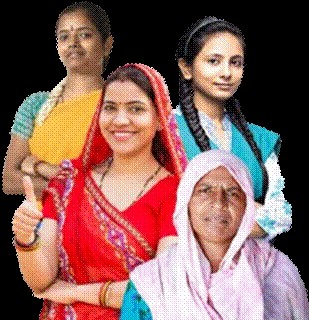
Today, women are leading self-help groups, launching businesses, breaking barriers in science, defence, and sports, and shaping the nation’s future. With women and children comprising nearly 67.7% of India’s population, their empowerment is not just social reform—it’s a strategic imperative. As India enters Amrit Kaal, Nari Shakti stands as the unstoppable force driving a stronger, more inclusive nation forward.
Empowerment at Every Stage of Life
Women empowerment is crucial to India's growth. Days of seeing women as 'homemakers' have gone, we have to see women as nation builders!” -PM Narendra Modi
Empowerment isn’t a singular event — it is a journey. The Modi government’s policies reflect this reality through programmes designed to support women through every phase of life. Prime Minister Narendra Modi has time and again reiterated that a nation can progress only when its women are equally empowered. Over the last 11 years, the Government of India has adopted a comprehensive, lifecycle-based policy framework to empower women across social, economic, political, and legal domains. From constitutional safeguards and landmark laws against violence and discrimination, to transformative schemes like Beti Bachao Beti Padhao, Mission Shakti, and movements like the historic Nari Shakti Vandan Adhiniyam, the focus has shifted from women’s development to women-led development. Women’s participation has surged in education—especially in STEM—skilling, entrepreneurship through Self-Help Groups, and public service. Legal reforms and labour codes promote safe and inclusive workspaces, while schemes like PM Awas Yojana, DAY-NRLM, and agricultural support initiatives have empowered women financially and socially. From grassroots governance to defence forces and aviation, women are now leading across sectors, driving inclusive and sustainable national growth.
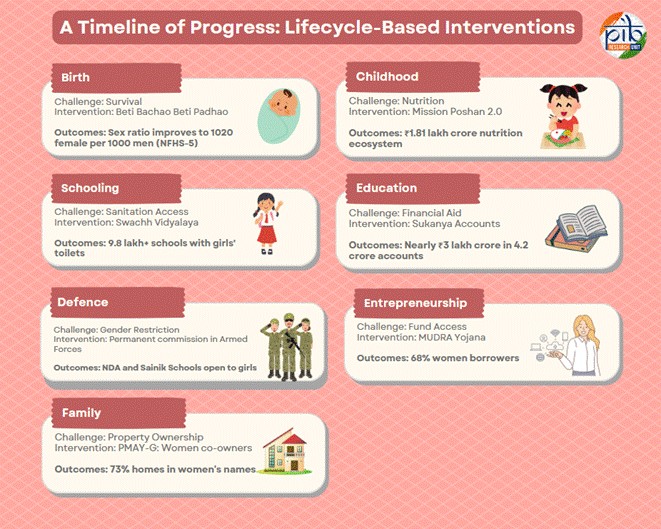
Improving Health, Building Nation
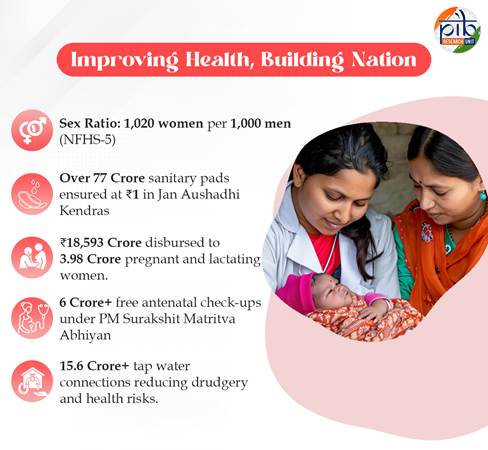
India’s fight against malnutrition has taken a bold, unified leap through Mission POSHAN—a transformative initiative that weaves together nutrition, health, and community to build a healthier future. Designed as an integrated nutrition support programme, Mission POSHAN targets the most vulnerable—children, adolescent girls, pregnant women, and lactating mothers—by revamping both the content and delivery of nutrition services.
Mission POSHAN 2.0
With a visionary investment of over ₹1.81 lakh crore, Poshan 2.0 is being rolled out over the 15th Finance Commission period (2021–22 to 2025–26) to build a culture of well-being—through improved practices, stronger immunity, and holistic wellness. It unites efforts across sectors, creating a convergent ecosystem that transforms nutrition into a shared mission of national development.
At the heart of this movement lies POSHAN Abhiyaan, launched in 2018—a flagship programme that combines cutting-edge digital tools with grassroots action. From real-time tracking of nutrition indicators to community-driven campaigns, it has ignited a behavioural shift around food, health, and hygiene. This mission isn’t just about feeding people—it’s about fuelling a healthier, empowered India.
Upgradation to Saksham Anganwadis
The government set a target to upgrade 2 lakh Anganwadi Centres (AWCs) across the country during the 15th Finance Commission cycle (at 40,000 AWCs per year) under Mission Saksham Anganwadi and Poshan 2.0. These upgraded centres aim to deliver improved nutrition and Early Childhood Care & Education (ECCE), supporting holistic development of children under six.
- In FY 2024–25, full approval was accorded for the upgradation of 2 lakh AWCs.
- So far, 24,533 AWCs have been transformed into Saksham Anganwadis.
Poshan Bhi Padhai Bhi (PBPB) Initiative
Launched to integrate early education with nutrition, this initiative focuses on building the capacity of Anganwadi workers to provide quality pre-school education.
As of 31st March 2025, 36,463 State-Level Master Trainers (SLMTs) and 4,65,719 Anganwadi Workers have been trained nationwide.
Recognised for Innovation: Poshan Tracker Achievements
The Poshan Tracker application received the Prime Minister’s Award for Excellence in Public Administration 2024 (Innovation Category - Centre) on Civil Services Day.
- Won the National Award for e-Governance (Gold) at the 27th National Conference in September 2024.
- 99.02% of beneficiaries are now Aadhaar-verified (as of March 2025).
- A Face Authentication module has been introduced for Take-Home Ration (THR), ensuring transparency and accountability through a two-factor authentication system.
Suposhit Gram Panchayat Abhiyaan
Launched by the Hon’ble Prime Minister on 26th December 2024, this campaign identifies and rewards the Top 1000 Gram Panchayats demonstrating exceptional grassroots work in improving nutrition and health outcomes. These “Suposhit Gram Panchayats” serve as models of community-led progress in child and maternal nutrition.
Universal Immunization Programme (UIP)
The Universal Immunization Programme (UIP) is one of the world’s largest public health efforts, reaching approximately 2.9 crore pregnant women annually, protecting both mothers and their newborns from vaccine-preventable diseases.
Janani Shishu Suraksha Karyakram (JSSK)
The Janani Shishu Suraksha Karyakram (JSSK) was expanded in 2014 to include care for all antenatal and postnatal complications, ensuring that mothers and newborns receive essential services, particularly within the critical first 48 hours after delivery. Since 2014–15, the programme has benefitted over 16.60 crore beneficiaries, significantly reducing out-of-pocket expenditure for families.
Janani Suraksha Yojana (JSY)
Complementing JSSK, the Janani Suraksha Yojana (JSY) has also made a significant impact, supporting over 11.07 crore beneficiaries by March 2025. This conditional cash transfer scheme encourages institutional deliveries among poor pregnant women, especially in rural and underserved areas.
Surakshit Matritva Aashwasan (SUMAN)
Further strengthening maternal and neonatal care, the Surakshit Matritva Aashwasan (SUMAN) initiative assures zero-cost access to quality healthcare services for pregnant women, sick newborns, and mothers up to six months after delivery. Through this initiative, beneficiaries receive dignified, respectful care from trained professionals in certified facilities. As of March 2025, 90,015 SUMAN health facilities have been notified across the country.
Pradhan Mantri Surakshit Matritva Abhiyan (PMSMA)
It played a critical role in ensuring maternal health by offering four comprehensive antenatal check-ups during the first trimester to ensure timely detection of high-risk pregnancies.
Pradhan Mantri Matru Vandana Yojana (PMMVY)
Aimed at promoting institutional delivery and ensuring maternal health, the scheme provides direct cash benefits of ₹5,000 to pregnant and lactating women. It has ensured better nutrition and health monitoring during pregnancy.
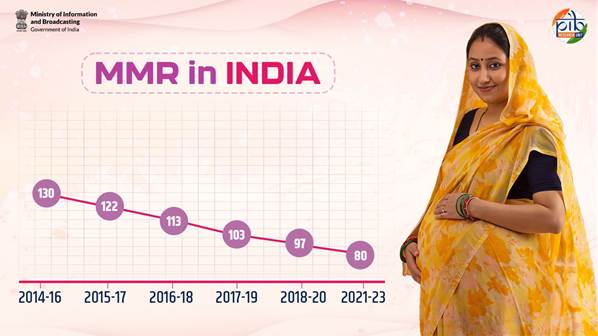
Dignity in Daily Life: A Silent Revolution
True empowerment begins with dignity — a safe home, clean fuel, private toilets, and water at the doorstep. The Modi Government has placed women at the centre of India’s development journey, transforming everyday struggles into opportunities for health, safety, and self-reliance. From housing to hygiene, each initiative has uplifted lives and strengthened the foundation of Nari Shakti in rural India.
Pradhan Mantri Awas Yojana – Gramin (PMAY-G)
Launched in 2016, Pradhan Mantri Awas Yojana – Gramin (PMAY-G) turned dreams into concrete homes. 73% of nearly 2.75 crore PM Awas-Gramin beneficiaries are women Owning a house has not just given women shelter — it has given them dignity, security, and a seat at the decision-making table.
Ujjwala Yojana
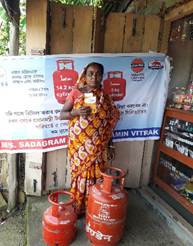
With the launch of the Pradhan Mantri Ujjwala Yojana (PMUY) in 2016, 10.33 crore LPG connections have been distributed, liberating women from hazardous fumes. The International Energy Agency hailed it as a milestone in health and environmental reform, and a crucial step in bridging gender inequality.
Swachh Bharat Mission
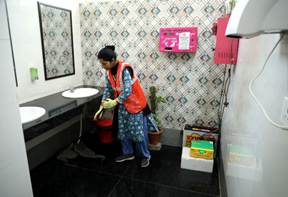
Before 2014, only 39% of Indian households had access to toilets. Women and girls bore the brunt of this indignity — risking health, harassment, and humiliation. The Swachh Bharat Mission, launched in 2014, changed that narrative. Over 12 crore toilets have been built under SBM-Gramin, bringing a profound sense of safety and self-respect to women. A study revealed that post-toilet construction:
- 93% of women no longer feared harm or infection,
- 92% felt safe at night, and
- 93% could stop limiting food and water intake just to control the need to defecate.
Jal Jeevan Mission
Fetching water, often from long distances, was a daily burden for rural women. Jal Jeevan Mission (JJM), launched in 2019, sought to end this drudgery. Over 15.6 Crore Tap Water connections are transforming rural living, a dramatic leap from the mere 3.23 crore in 2019. JJM has empowered women, not just by saving their time, but by involving them in planning, execution, and monitoring of water supply — making them the true stakeholders in their community’s future.
Education and Digital Literacy
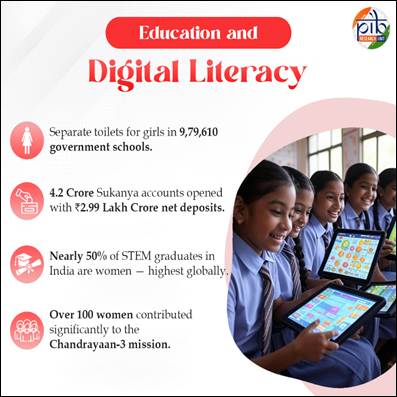
Beti Bachao Beti Padhao (BBBP)
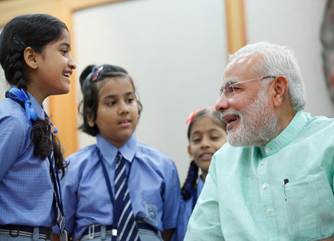
As per the Health Management Information System (HMIS) data of Ministry of Health and Family Welfare, Sex ratio at Birth (SRB) at National level has improved from 918 (2014-15) to 930 (2023-24). As per UDISE data of Ministry of Education, enrolment of girls in the schools up to secondary has increased from 75.51% percent in (2014-15) to 78% in 2023-24.
Sukanya Samriddhi Yojana (SSY)
The Sukanya Samriddhi Yojana (SSY), launched on 22nd January 2015 has completed a decade of empowering girl children through financial security. As of November 2024, over 4.2 crore accounts have been opened across India, reflecting widespread public participation and trust in the scheme. Marking its 10-year milestone in January 2025, SSY continues to encourage families to invest in their daughters’ futures—fostering financial inclusion, gender equity, and long-term social progress.
Social Welfare and Development
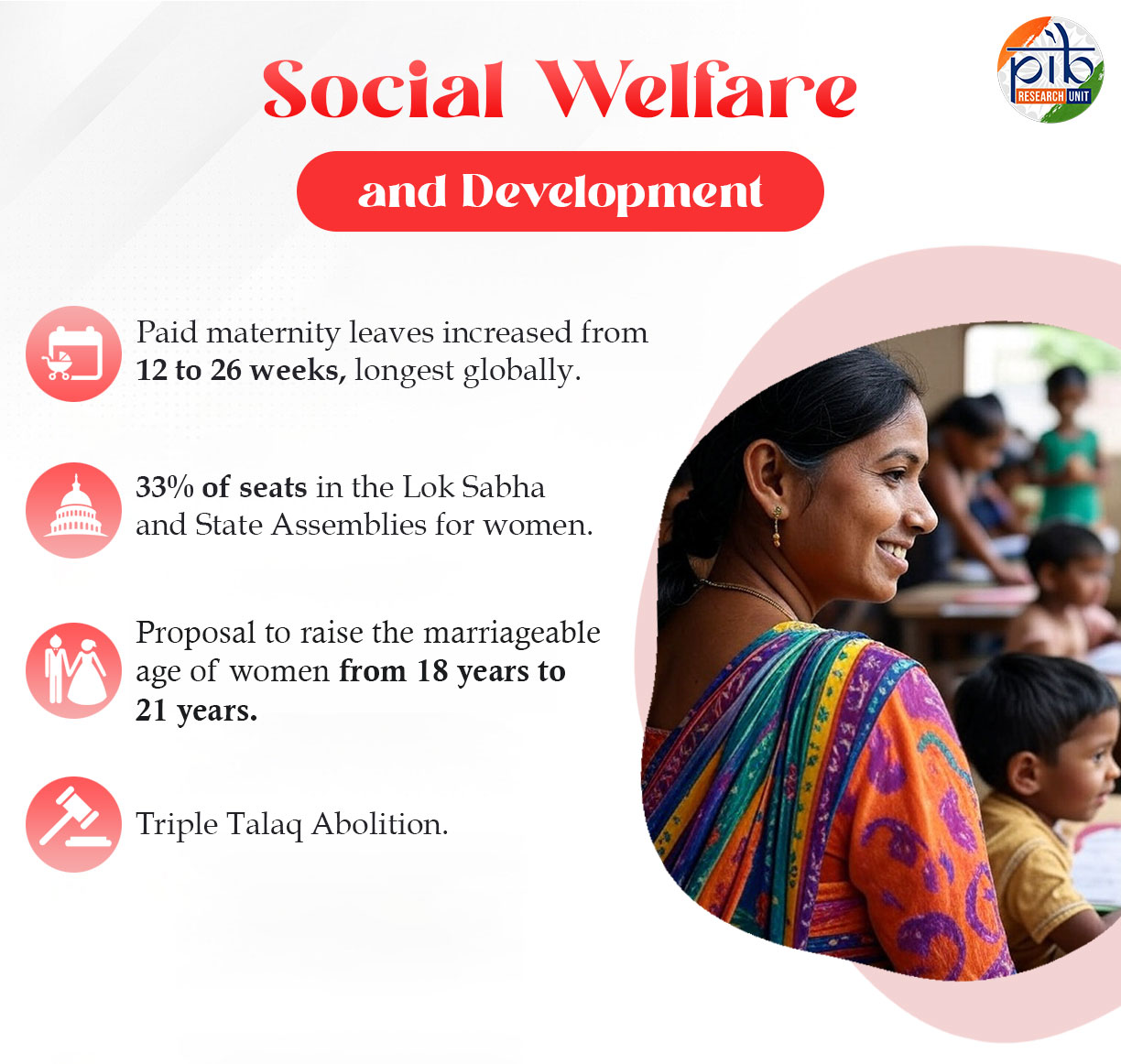
India’s journey of women empowerment under Prime Minister Modi has been rooted in strong social welfare measures and has now evolved into a movement of leadership and agency. From welfare to leadership, Indian women are now shaping the nation’s destiny. Under Prime Minister Modi’s leadership, the narrative has shifted from viewing women as passive beneficiaries to recognising them as active agents of change.
Women in Defence
Today, women proudly wear the uniform in police services and across all wings of the armed forces, with permanent commissions now a reality. Historic milestones such as girls being admitted to Sainik Schools and the National Defence Academy mark a new era of opportunity and inclusion.
On May 29, 2025, the first batch of female cadets graduated from the National Defence Academy.
Women in STEM
In the fields of science and space, Indian women are reaching for the stars—quite literally. They played pivotal roles in the success of Chandrayaan-3, symbolising India’s scientific excellence and gender inclusivity. The country also boasts the highest number of female pilots in the world and leads globally in the proportion of women graduating in STEM (Science, Technology, Engineering, and Mathematics), reflecting the rise of a confident, capable, and ambitious Nari Shakti.
Nari Shakti Vandan Adhiniyam
Institutionalising this transformation, the landmark Nari Shakti Vandan Adhiniyam marks a constitutional leap for women’s political empowerment. By reserving 33% of seats in the Lok Sabha and State Assemblies for women — with dedicated representation for SC and ST women — this act ensures their rightful place in governance. It goes beyond tokenism, laying the foundation for a generation of female leaders who will shape India's future policies and progress.
Equal Rights for Women
The growing trust women place in Prime Minister Modi’s vision is rooted in meaningful reforms that impact their everyday lives.
- The abolition of Triple Talaq has given Muslim women the dignity and legal protection they long deserved.
- Proposal to raise the marriageable age of women from 18 years to 21 years will help with education and employment opportunities.
- Doubling maternity leave to 26 weeks puts India among the most progressive nations in supporting working mothers.
- And with the scrapping of Article 35A, women in Jammu & Kashmir now enjoy equal property and legal rights — a historic correction of past injustice.
Financial Inclusion and Economic Empowerment
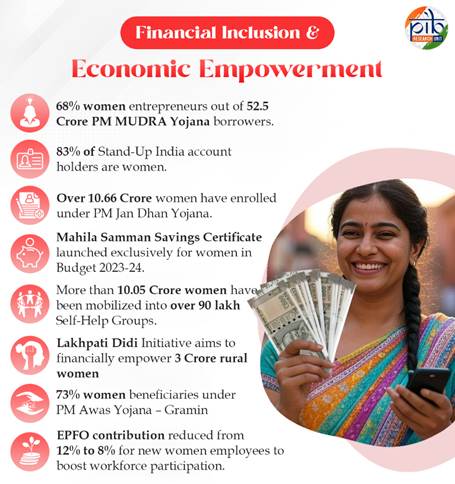
Women in India have immense potential to drive change when given the right opportunities. As the nation accelerates on its path of growth, the ambitions and expectations of women are also rising. Recognizing this powerful shift, the Government of India has launched key initiatives to support aspiring women entrepreneurs and remove barriers to accessing institutional credit. Two flagship schemes—Pradhan Mantri MUDRA Yojana (PMMY) and Stand-Up India—have played a crucial role in this transformation.
Pradhan Mantri MUDRA Yojana (PMMY)
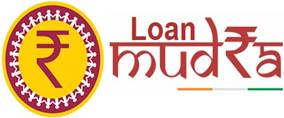
The scheme provides loans of up to ₹20 lakh across four loan products. By March 2025, Since the launch of the Pradhan Mantri MUDRA Yojana (PMMY), more than 52.5 crore+ loan accounts have been extended, with a sanctioned amount of ₹34.11 lakh crore and a disbursed amount of ₹33.33 lakh crore. Notably, about 68% of these loans were granted to women entrepreneurs, underlining the scheme’s pivotal role in boosting women-led businesses.
Stand-Up India Scheme
Launched on 5th April 2016, the Stand-Up India Scheme facilitates bank loans between ₹10 lakh to ₹1 crore to at least one SC/ST and one woman borrower per bank branch for setting up greenfield enterprises. The scheme was extended in 2019-20 to cover the 15th Finance Commission period from 2020 to 2025. As of March 2025, over 2.73 lakh accounts have been sanctioned under the scheme, out of which 2,04,058 loans, i.e. approx. 83% have been sanctioned to women, amounting to over ₹47,704 crore.
Deendayal Antyodaya Yojana – National Rural Livelihoods Mission (DAY-NRLM)
The scheme aims to empower rural women by promoting self-reliance, skill development, and sustainable livelihoods. Under it, over 10.05 crore women have been mobilised into 90.90 lakh Self Help Groups (SHGs). Taking this empowerment a step further, the Lakhpati Didi Initiative has emerged as a game-changer. As of March 2025, it has enabled 1.48 crore SHG members to earn a minimum annual income of ₹1 lakh through diversified and sustainable livelihood activities.
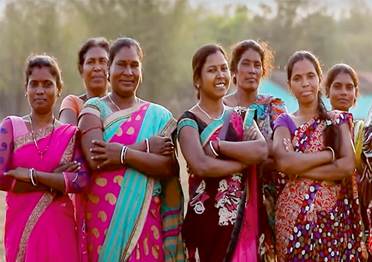
Safety and Security

Mission Shakti
Launched in mission mode, Mission Shakti is a flagship initiative by the Government of India to ensure the safety, security, and empowerment of women across all stages of life. Moving beyond piecemeal approaches, it adopts a lifecycle-based strategy to transform women into equal stakeholders in the nation-building process. It also fosters convergence across schemes and encourages community participation, particularly through grassroots initiatives.
Two Pillars of Mission Shakti:
Sambal – Focuses on women’s safety and security, with upgraded schemes such as:
One Stop Centre (OSC): Designed to support women facing violence in private or public spaces, OSCs now include a provision for a dedicated emergency rescue vehicle with an annual grant of ₹4.5 lakh per centre. A new digital feature, “Book Appointment at OSC”, has been added to the Mission Shakti Dashboard, allowing distressed women to schedule appointments online for timely support.
As of 28th February 2025, 908 OSCs have been approved, with 819 operational, assisting over 10.98 lakh women since their inception on 1st April 2015.
Women Helpline (WHL): Fully integrated with ERSS 112 in 35 States/UTs (excluding West Bengal). It is also integrated with the Child Helpline in 33 States/UTs and with 536 OSCs.
Since inception, 214.78 lakh calls have been received and 85.32 lakh women have been assisted nationwide.
SHe-Box Portal: Launched on 29th August 2024, this Sexual Harassment Electronic Box is a digital platform under the SH Act, 2013, offering a user-friendly mechanism for women to report workplace harassment and seek redressal.
Nari Adalat: A grassroots initiative promoting community-based women-led justice mechanisms, currently operational in: 50 Gram Panchayats each in Assam and Jammu & Kashmir. Soon to be expanded in 10 Gram Panchayats each in Bihar, Karnataka, Uttar Pradesh, and 5 in Andaman & Nicobar Islands.
Samarthya – Focuses on empowerment and self-reliance through education, skill development, and institutional support:
Shakti Sadan (formerly Swadhar Greh and Ujjawala Homes): From 2014-15 to 31st December 2024, over 2.92 lakh women have benefited, with ₹630.43 crore released to States/UTs for its implementation.
Sakhi Niwas (formerly Working Women Hostel): In the same period, 5.07 lakh women have been supported under the scheme, with ₹196.05 crore allocated to States/UTs.
#AbKoiBahanaNahi Campaign
Launched on 25th November 2024 by Hon’ble Minister Smt. Annpurna Devi, this national campaign against gender-based violence is a joint initiative by the Ministries of Women & Child Development and Rural Development, with support from UN Women.
Conclusion
Over the last 11 years, the Modi government’s unwavering commitment to women’s empowerment has transformed social welfare from a safety net into a springboard for leadership, dignity, and opportunity. In the last decade, India has laid the foundation for a future where women are no longer just participants — they are leaders, innovators, protectors, and entrepreneurs. From space missions to grassroots governance, from kitchens to boardrooms, Nari Shakti is marching ahead — stronger, freer, and more determined than ever.
The journey from welfare to leadership is well underway. And the next chapter of India’s story will undoubtedly be written by its empowered women.
References:
New Momentum for Nari Shakti
*****
Explainer 07/ Series on 11 Years of Government
Santosh Kumar/ Ritu Kataria/ Priya Nagar
(Explainer ID: 154585)
आगंतुक पटल : 9611
Provide suggestions / comments